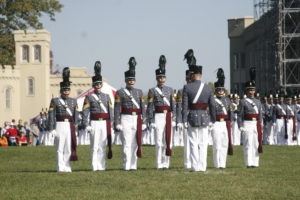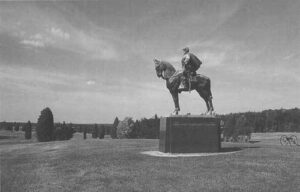This past weekend I was at Virginia Military Institute celebrating my 50-year graduation reunion. It was a super nice weekend, not only for the memories it stirred up but especially for the opportunity to interact with guys with whom I spent four years at VMI. In fact I hadn’t seen many of them since graduation day back in 1972. As you can imagine, some members of our class, including one of my roommates, have passed away. Part of the reunion activities was a memorial service for them.
It was disappointing to me that the VMI administration had caved in to public pressure and removed the big statue of Stonewall Jackson that was situated on the parade ground in front of the school. Jackson had taught at VMI. Just before the battle of Chancellorsville commenced, Jackson surveyed his officer corps and stated, “The Institute will be heard from today.”
Unfortunately, they had also removed Jackson’s name from a quote that hangs over the main archway leading into barracks, which had a big impact on me during my four years at VMI: “You may be whatever you resolve to be.”
They also removed Jackson’s name from Jackson Memorial Hall, where the memorial service was held for our deceased classmates. It’s now just Memorial Hall. Fortunately, they haven’t taken down the enormous mural at the front of the hall that depicts the battle of New Market, where the VMI cadet corps broke a stalemate and routed the Yankee forces, causing them to flee the battlefield in fear and humiliation.
But the way I figured it was that I wasn’t at my reunion because of decisions made by the VMI administration that related to the Civil War. I was there to see and interact with my classmates.
In fact, my relationship with the VMI administration wasn’t very good even when I was there. My four years at VMI were long before I discovered libertarianism in my late 20s. When I matriculated in August 1968, like many other Americans I was a big supporter of America’s intervention in Vietnam. Like so many other people my age, I had been indoctrinated in our public (i.e., government) schools into believing the standard Cold War nonsense — that American troops were being sent to Vietnam to protect America from the supposed communist conspiracy emanating from Moscow (Yes, that Moscow!), which was supposedly hellbent on taking over Vietnam and the rest of the world, including the United States.
By the time I reached my second-class (i.e., junior) year, I had achieved a “breakthrough.” It wasn’t, of course, a full-fledged breakthrough to libertarianism. That would come later. But it was enough of a breakthrough to recognize that the war was nothing but a crock, one in which U.S. soldiers were being killed, maimed, and injured for no good reason at all.
Needless to say, that was not the perspective of the VMI administration and VMI’s military-science department. They continued believing that patriotism entailed supporting America’s fight against communism in Vietnam.
Of course, I wasn’t the only VMI cadet who had turned against the war by 1970. There were lots of others, including first-classmen (i.e., seniors) who would soon be sent to Vietnam to fight and kill communists — or be killed, maimed, or injured trying to kill communists.
In fact, because of Vietnam, there was a lot of tension building up within the corps of cadets during my third-class (sophomore) and second-class (junior) years. Among the most moving and dramatic episodes that contributed to the tension were announcements of deaths of VMI graduates in Vietnam. It would periodically happen in the mess hall during dinner. I don’t recall the exact words that were used but someone would go to the microphone and say something like, “Attention to orders. Republic of South Vietnam.” Silence would immediately sweep across the mess hall. You could hear a pin drop. Everyone knew what was coming. “February 28, 1969. Lt. John Smith, VMI Class of 1968, killed in action this day.” Since the school was fairly small — around 1,000 or so cadets, there was a good chance that many of the cadets would be acquainted with those who were killed.
One day, an administration tactical officer caught two seniors in barracks with alcohol. I’m almost certain it was during the spring semester. He knew that the two guys were about to graduate. The likelihood was high that they would be sent to Vietnam as combat officers soon after graduation. The tac officer could have simply looked the other way and walked away. After all, what’s the big deal with 22-year-old guys who would soon likely be facing battle and the prospect of death breaking regulations and having a couple of drinks in barracks? The tac officer chose not to do that. Instead, he wrote them up and reported them, knowing full well what would happen to them. After going through four years at VMI, they were both summarily dismissed a few months before graduation.
Ordinarily, when the corps of cadets marched to dinner, we would sing cadence songs. Not that evening. As the corps passed in review of that tac officer, we gave him the total “silent treatment.” Then, everyone entered the mess hall in silence, followed by the tac officer. As soon as he sat down at the head table, the entire corps stood up, didn’t say a word, and just walked out. It was awesome!
When we returned to barracks, we came very close to what is called a “step-off” in VMI lore, an event in which the cadet corps goes into full-fledged revolt against the administration. Cadets let off steam by yelling, screaming, banging doors, and throwing all sorts of junk into the courtyard. I later heard that the tac officer’s military career was damaged by the experience, which, in my opinion, was a good thing.
By the time my class graduated in May 1972, the Vietnam War was winding down and so, fortunately, none of my classmates were killed in that senseless foreign intervention.
In any event, by the end of my junior year, the VMI administration was well aware of my “breakthrough.” Although I was a corporal and a sergeant during my sophomore and junior years and, therefore, set to be a cadet officer my senior year, they busted me down to private my senior year. That actually turned out to be not so bad because everyone left first-class (i.e., senior) privates alone — it was considered sort of an honorific position at VMI!
Unlike other colleges, at VMI the valedictorian is not the person with the highest grade point average. Instead, the valedictorian is selected by the members of the senior class. In the spring semester of my senior year, I learned that my classmates had selected me to be their valedictorian. It remains the biggest honor I have ever received. In fact, at the reunion some of my classmates paid me the high honor of coming up to me and telling me that they still remembered my talk to this day.
A couple of weeks before graduation, someone came into my room and said that the administration wanted to see a copy of my speech. They were clearly nervous, especially since the governor of Virginia would be speaking at the commencement exercises. I told him that I was still working on it, which was true. But the week before graduation, I did my best to stay away from my room so that they would have a difficult time finding me. I wasn’t about to let them censor what I had to say.
On graduation day, I delivered my speech and received a standing ovation from the entire corps, which was the second-biggest honor of my life. I later got some nice feedback from a tactical officer who I held in very high esteem. But I doubt that the VMI administration was very happy about my speech, especially since some of it was critical of administration policies. A reporter wrote a story about it that hit the wire services.
I recently reread a transcript of my speech and was surprised at the libertarian nature of it, given that I had still not discovered libertarianism. If you would like to read it, it is here.
I got a fantastic education at VMI, which helped me to get into law school at the University of Texas. I learned the importance of honor, especially given the critically important role that VMI’s strict student-run Honor Code plays in cadet life. I received excellent military training, which, fortunately, I never had to use in wartime. And I made friends with 225 classmates, many of whom I got to see at our 50th-class reunion this past weekend.
Finally, I often tell people that the other thing I learned at VMI was what it’s like to live in a socialist society — one in which the state takes care of you, watches over you, feeds you and clothes you, wakes you up and puts you to sleep, regulates every minute aspect of your life, and severely punishes you when you transgress rules and regulations. For a libertarian, that is an extremely valuable experience.





